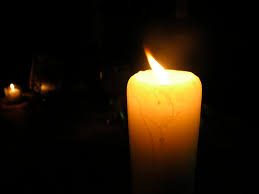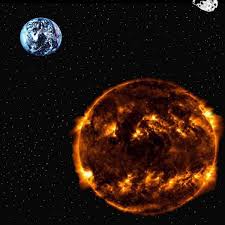Advent 1-B/Nov. 30, 2008
Isaiah 64:1-9
Psalm 80
1 Corinthians 1:1-9
Mark 13:24-37
Fear.
If popular culture is any measure, we love to indulge in fear.
How many of you ever watch those ghastly made-for-TV dramas about child murderers and avenging mothers, or those real-life video drug busts, or any number of those truly psychotic and violent fantasies that can be found on network television on any night of the week? Apparently a lot of us do, or TV networks wouldn't be able to sell advertising time to air them.
We spin a web of fear around us, and in so doing we create monsters. We become like Frankenstein: we have created something out of the imagination and skill and power of our own culture that terrifies us, and we cannot pull ourselves out of that terror.
We fear what we cannot control; ultimately, of course, we fear death: as the Gospel for today says, we do not know when the time will come. We do not know what to expect or when to expect it. When we fear death, we fear everything that reminds us of it: we fear loss and clutch at the familiar for security; we fear change and throw all our energy into keeping things the same.
Our thoughts in Advent are guided by lessons from the Bible that focus on the End Times. Today’s lessons are full of scary thoughts about the End of Days. A thousand years ago, at the end of the first millennium, as well as just a few years ago, at the end of the second millennium, the air was full of such talk.
As the year 200 approached, people flocked to Jerusalem convinced that they were characters from the Bible, and that God had called them there to witness these End Times. Even in normal times, like this year, there may be 150 cases a year of what is called the Jerusalem syndrome. Some tourists arrive mentally disturbed and become convinced that they are biblical figures, King David, or Jesus, or John the Baptist or the Virgin Mary. They might think they are in a living version of the “Jesse Tree” that is depicted on our leaflet – that they themselves are related to this holy family of Jesse, David, Mary and Jesus. Others come to Jerusalem with visions of the end of the world. Not all the victims of this identified syndrome arrive in a disturbed state but they feel compelled to don bed sheets from their hotels and take to the street to preach rambling sermons. Word has it that Jerusalem is bracing in this season of Advent for a “Sudden surge of Saviors. “ ‘Tis the season of anticipation, the season of fear, change is ever upon us.
What goes on in far-off Jerusalem may not seem relevant to us here, but think of
this: we saw splashed across our televisions this week the most horrific scenes and sounds coming from Mumbai, India. Terrorists broke into hotels and killed people who were Americans or Westerners or rich or Jewish. This was a terrible version of the end of times – only this time with no righteous ruler came down from the heavens. Something terrible, but something far away.
What brought the fear home to me was the image of a two-year-old boy, in the arms of his caregiver, fleeing his home where his parents, a Jewish rabbi and his wife, were being held hostage. The child is now in Jerusalem, with his grandparents. The terrible scene from the other side of the world was brought home to them, the fear of the end times made immediate. In this world of instant communication, of pictures sent round the world in a flash, we are never far from images that disturb or frighten us. The world is moving too fast.
Change is profoundly difficult to deal with. We are caught off guard, and confronted with the possibility of loss and even death, and that is where Advent comes in. Jesus in today's gospel talks about the most horrible things: about the explosion of the universe, about suffering, about anxiety and sleeplessness. The community to whom Mark addressed these words of Jesus was a community who saw their friends and families persecuted and killed by Roman authorities. Paul's letter to the Corinthians was addressed to people who were struggling with the cost of what it meant to be Christian, with giving up the pleasures and conveniences of pagan society to be ostracized and possibly killed for this new gospel.
Advent is about not putting faith in the things we have created, no matter how beautiful or comforting or technologically superior. Advent is not about security in this world. Advent is about putting faith in the one thing that will never change: God.
During Advent we focus on Emmanuel, God with us. God has been with us throughout history, throughout times of more disturbing and violent change than even this one.
God is with us today, speaking to us through the things that challenge us and discomfort us.
God is with us as the poor, the hungry, the imprisoned, the sick, as last week's gospel told us.
And God is with us into the future, giving us hope that even these things which we fear the most are in God's hands.
O come, Emmanuel.
Visit us during this season of deepening darkness,
and shed enough light to scatter our fears.
Advent 2-B/Dec. 7, 2008
Isaiah 40:1-11
Psalm 85
2 Peter 3 : 8-15a,18
Mark 1:1-8
We wait for a new heavens and a new earth, where righteousness is at home.
I’m going to take a risk here, to talk about something we all may not share: parenthood. I’m hoping, though, that even if you are not a mother or a father, that you can resonate with the hopes I had – that I think many parents have – at the birth of their children.
The hopes I had were hopes that the world my child would grow up in would be a wonderful place. I hoped my child would not be terrified by war, famine or disaster. I hoped my child could run and play in green fields and breathe clean air. I hoped for a world where there was enough of everything to go around. On a more mundane level, I hoped for a world free from junk food and commercial television. Whatever I hoped for – and I imagine you have a list of your own hopes, as well – it was a version of the new heavens and the new earth. And in a way, the experience of life now, in the world as it is, is the experience of the exile. With my hopes for that new heavens and that new earth, living in this earth seems kind of like a displacement. There is a loss, when life does not turn out the way I thought it would.
The prophet Isaiah was speaking to people in exile – the people of
What can we learn from these people in their long-ago exile? We who may feel a little displaced and out of step in the world we live in?
We can know that this ragged space of our lives is where God meets us. Here. Now. The world may not make sense at times, but that craziness does not define us; God does. Because we know we are God’s, we can resist the things that make us mad, things that we know are out of whack, things that are unjust and cruel and crazy.
Because we know we are God’s and we know that God meets us here, in this place, we know that whatever we do to make this world a better place, the place we know God would want it to be, will not be in vain. Jeremiah, the other prophet of
When Mark the gospeller told this story of John the Baptist, he knew these themes would resonate with his audience. He knew that they would understand what it meant to be called by God out of the wilderness. He knew they would be familiar with the strange messages prophets would bring. He knew they were people who felt out of place in their own world, people who knew the world was out of whack and unjust, people longing for a new heavens and a new earth. John the Baptist came out of the wilderness to people who felt exiled in their own countryside and said, like Isaiah, Here is your God!
What do we make of John the Baptist? Does that wilderness from which he hails make any sense to us today? I think John’s message, which is unsettling and disconcerting, may not make sense to people who are satisfied with the status quo of this world. It may not be a message of hope to people who like the world the way it is. But to those of us who have higher hopes, who seek a new heavens and a new earth, this stranger with his rough clothes and his peculiar diet, brings very good news indeed.






.jpg)
.jpg)







.jpg)

No comments:
Post a Comment